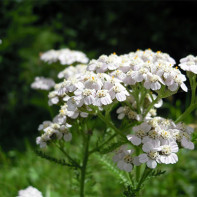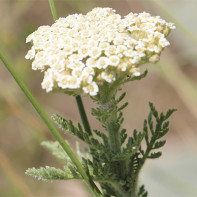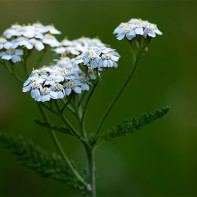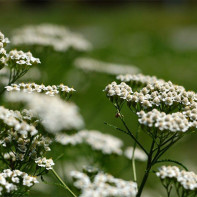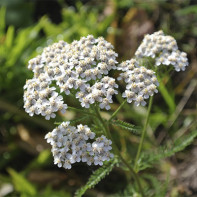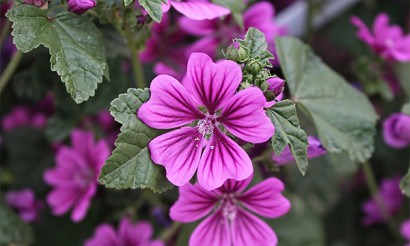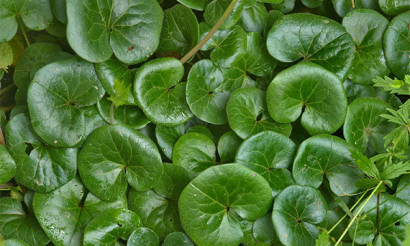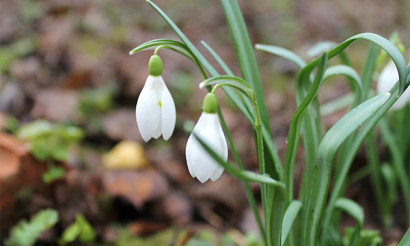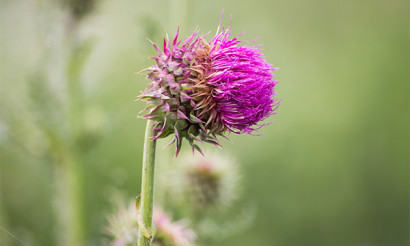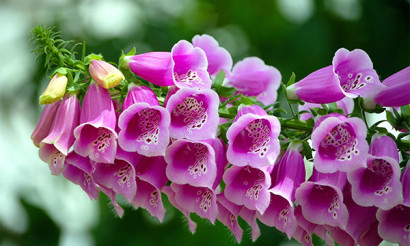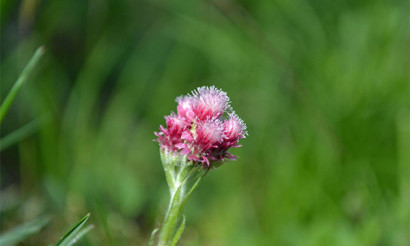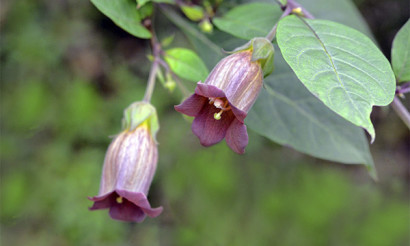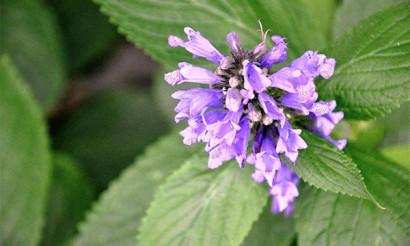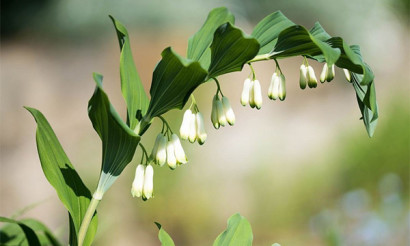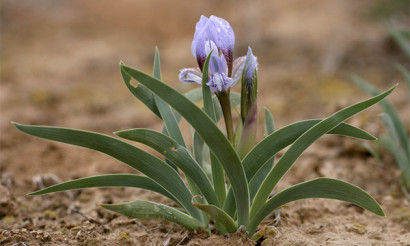Yarrow: therapeutic properties and contraindications
Yarrow is widely used in medicine, cosmetology, cooking, dietetics. The plant is often included in anti-cellulite means for massage. Also yarrow is a strong anthelmintic and antiseptic. Means on its basis evenly remove keratinized skin particles, eliminate sweating, effectively fight fungi.
- Chemical composition
- How it looks and where it grows
- Types
- Collection and storage
- Therapeutic properties of yarrow
- For women
- For men
- In pregnancy
- When breastfeeding
- For children
- When losing weight
- Yarrow in folk medicine
- With constipation
- With angina
- With skin diseases
- In alopecia
- In dysentery
- For diabetes
- In pancreatitis
- For gastritis
- For bowel
- For bowel
- For constipation
- For colitis
- For the liver
- For kidneys
- For hemorrhoids
- For cholecystitis.
- For cystitis
- For prostatitis
- For mastopathy
- For varicose veins
- For cough
- For fever
- From worms
- Heartburn
- Allergies
- For oncology
- In menopause
- If thrush
- For flatulence
- When asthma
- Types of medicinal compositions
- Infusion
- Infusion
- Decoction
- Tea
- Ointment
- Yarrow oil: properties and uses
- Cosmetic applications
- For hair
- For skin
- Contraindications for use
- Is it possible to give rabbits yarrow
Chemical Composition
The composition of yarrow includes the following chemical elements and compounds:
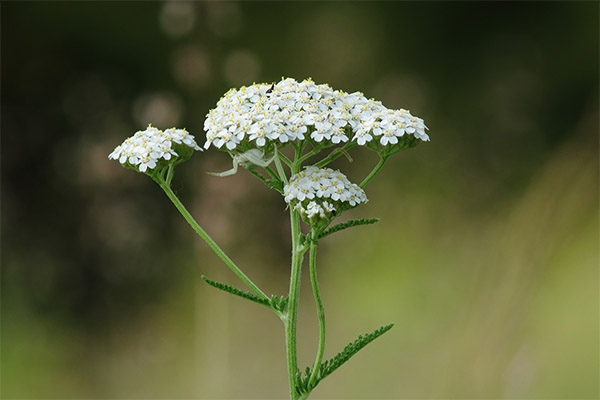
- Aconitic acid - increase of enzymatic properties of intercellular substance, acceleration of intracellular metabolic processes.
- Achillein - increase in the number of platelets in the blood plasma.
- Coumarin (low concentration) - inhibition of blood clotting.
- Inulin and asparagine - normalization of protein and fat metabolism.
- Choline - normalization of bile viscosity and acidity.
- Cineol - effect on gram-positive bacteria by fluid intake.
- Caryophyllene - elimination of depression.
- Camphor - strong mucolytic.
- Tannins - withdrawal of fluid from mucous membranes, blood, increase in viscosity.
- Quercetin - restoration of neuronal activity of the spinal cord.
- Tuiol (slight concentration) - toxic to humans.
- Vitamins K, C.
How it looks and where it grows
Yarrow grows in the temperate climatic zone of Eurasia and North America. The plant is also cultivated in Australia. The name comes from the numerous segments of the leaf. The plant is more often found in forest meadows, in bushes, in the steppe. The vegetation cycle is 3-5 years.
The root system is taprooted and the stems are erect. The average height is 50-80 cm, the maximum height is more than 120 cm; the leaf blade is up to 15 cm long and 3 cm wide. The outline of the leaf lanceolate. The leaf is divided into small segments resembling feathers. The edge width is up to 0.2 cm, with a small non-spiny thorn at the end. Radical leaves are stiff and large, while the stem ones are smaller and softer.
Inflorescences are gathered in baskets. Flowers are pink or white along the edges. Closer to the middle the flowers are yellow. The fruit is a wingless seed up to 5 mm long.
Types
Yarrow belongs to the dicotyledonous class of the Asteraceae family and has over 100 species. The most common is common yarrow.
Other species:
- Ptarmica - has pronounced bactericidal properties.
- Tavolga - the rarest.
- Large-headed - blooms in late summer, moisture-loving.
- Ageratolous - sun-loving, grows mainly in calcareous soil.
- Felted - frost-resistant.
- Goldenseal - blooms from June to September.
- Umbrella - mainly used in landscape design.
- Keller's yarrow - evergreen.
- Serbian - likes sandy soil, unpretentious to growing conditions.
- Rotta - moisture-loving.
For medicinal purposes use high-growth species: large-headed, ptarnik, common.
Gathering and storage
Yarrow is collected in June and August. Inflorescences should be cut on 3-5 days from the start of flowering. For medicinal purposes, it is not recommended to collect the stems, there is a high concentration of tannins and poisonous substances. An overdose can lead to intoxication of the body, bradycardia, clogging of blood vessels due to blood clotting.
For cosmetology, it is desirable to collect the stems, leaves at the end of August. For external use as an anti-fungal, anti-cellulite remedy, take only the stems when the plant begins to dry.
Dry either in an electric dryer or in the open air without exposure to sunlight. Ultraviolet light enhances the action of resins, the breakdown of vitamin C, esters, which weakens the anti-inflammatory action. For oral use, this method is prohibited, it leads to rapid dystrophy, intoxication of the body, the destruction of mucous membranes, bone tissue. The method is indispensable for the treatment of purulent hemorrhoids, as antifungal agents for external use, venereal diseases in the form of baths, ointments, enemas, degreasing the skin on the head (rinses).
To treat facial skin use only young leaves or flowers on day 1-2 of flowering. Leaves should be collected in late April, May, and dried outdoors. The rule is also valid for bathing babies. As enemas for children from 6 months to 3 years can be used only young leaves, preferably in fresh form.
Dry, tightly closed glass containers should be used for storage. Dry sterilization is mandatory before packing. If the plant is stored in a cloth bag, there should be no other vegetables, fruits, dried fruits, plants in the room. Yarrow does not change its chemical properties only near St. John's wort. Proximity with grapes, raisins, prunes leads to increased properties on acidity, rapid release of bile, vomiting regardless of the type and amount taken.
In anemia, the raw materials should be dried separately, stored in the same container with plantain 1 to 1. Use only as a gum rinse. 1 tsp. mixture pour 100 ml. boiling water, let cool to a comfortable temperature, without decanting, rinse your mouth. Portion is designed for one application. Do not prepare in advance, the remedy strongly tightens the gums. If anemia is accompanied by festering, you need to let the mixture stand overnight.
Young plants in an electric dryer is better to dry at a temperature no higher than +40°C, mature - +50°C. If there is moisture after drying, you need to preheat the oven to 200°C, put yarrow for a couple of minutes, turn it off.
For soups, salads, it is good to freeze young leaves. They should be washed, spread on a linen napkin, let dry, packed in plastic bags. Slicing before freezing is not desirable, as the seasoning comes out dry in dishes. If frozen in ice molds, raw material is bitter.
For meat marinades, chop young leaves, add 1 to 1 salt. Densely stuff the jar with dry sterilization, squeezing the juice at the same time. The ideal preparation is 1/5 of the total amount of salt and yarrow.
Take in equal parts yarrow and garlic. Pass through a meat grinder. Add one-third of the salt of the total amount, fold tightly into a dry sterilized jar without squeezing the juice. The seasoning is suitable for roasting pork, lamb.
You can use the dried herb in rejuvenating foot baths. For 3 liters of steep boiling water, take 1 tsp. mixture, for use as an antifungal agent - 4 tbsp. Hold the feet for no more than 5 minutes, then rinse with warm water. Store the decoction in the refrigerator for 6-7 months. Then it becomes hard, acquires a harsh taste.
Therapeutic properties of yarrow
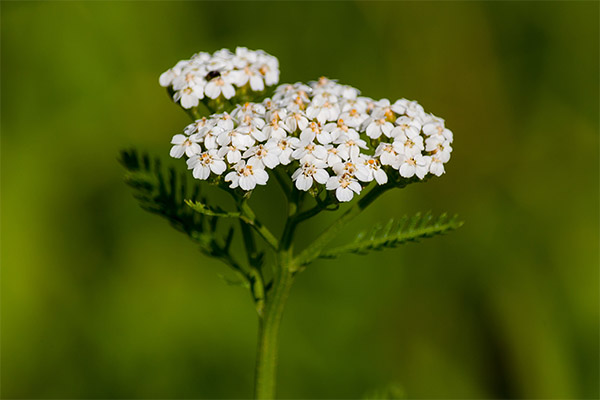
Yarrow has the following properties:
- binding;
- anti-inflammatory;
- antimicrobial;;
- antifungal;
- increasing the acidity of the blood, the GI tract;
- thickening of body fluids;
- drying of pus, mucous membranes;
- stimulation of protein synthesis (thickening of muscles);
- antipyretic (maximum effectiveness if fever is caused by an infectious pathogen);
- strengthening blood vessel walls in case of increased fluid balance;
- normalization of phospholipid metabolism (obesity, steatosis);
- elimination of stagnation of digestive secretions;
- normalization of mucous membrane consistency (in small amounts);
- reduction of sugar levels;
- wound-healing (preferably combined with chamomile and plantain to avoid scarring).
The herb should not be used as an immunostrengthening or anti-cancer agent for preventive purposes. As an immune booster it can cause autoimmune disease, also provokes neutralization and calcium leaching. As a rule, cancer cells when taken for preventive purposes begin to affect the brain, because of the acceleration of metabolic processes more quickly spread metastases. With a lack of fat in the diet, metastases affect the bones and internal organs.
For women
Yarrow is used in gynecology to treat thrush, mastopathy, tumors. Due to astringent properties the plant is effective for intrauterine bleeding, profuse discharge during menstruation, menopause:
- Prevents sweating, minimizes the causticity of perspiration;
- Has a calming effect;
- normalizes hormonal balance;
- Improves health;
- Increases the elasticity of the walls of the genitourinary system;
- normalizes the consistency of discharge;
- Prevents a decline in libido;
- stimulates mental activity.
Yarrow stimulates the production of prolactin, so teas are effective during lactation.
Bring 200 ml of water to steep boiling water. Add 1 tsp. fresh raw materials. Put in a cool place, but do not cover, strain before use. Do not keep more than an hour. If you brew dried raw milk can be bitter. It is desirable to take the young leaves.
When menopause is good to use flowers. Leaves have a calming effect, eliminate the acrid smell of sweat, headaches. Flowers stimulate the production of estrogen, mitigating the negative effects of body restructuring during menopause. The stems have a strong astringent effect.
Vaginal suppositories are used for suppuration due to helminthiasis, infections. Bring 20 grams of pig fat to a boil in a water bath. Add 1 tsp. honey, 4 tablespoons of pine needles and yarrow. Boil over low heat for 12-15 minutes, allow to cool to lukewarm, strain. When the broth solidifies, form suppositories, wrapped in foil. Store in the freezer. Keep at room temperature for an hour before use. Use once a day, preferably at night. If there are erosions, reduce the needles to 1 tbsp. and add 5 tbsp. of plantain. Suppositories should preferably be prepared from fresh plants. For venous diseases, you can add 1 tbsp. each of celandine, nettle, and mother and stepmother.
With poor blood clotting after severe blood loss to 200 ml of boiling pomegranate juice take 1 tbsp. raisins, ¾ tsp. yarrow. Boil for 1-2 minutes. Add honey to taste. The drink should not infuse, drink hot, do not strain.
For Men
Due to anti-inflammatory properties yarrow is used to treat prostatitis, urethritis in the initial stage, other diseases of the genitourinary system of inflammatory and purulent nature.
With a cold of the genitourinary system to 3 liters of boiling water to take 10 tbsp. yarrow, 15-20 flowers of linden, 4 tbsp. chamomile. Boil for about 1 minute. Allow to cool to a comfortable temperature, strain. Take the bath for up to 5 minutes, rinse with warm water. If there are purulent secretions, add 2 tbsp. nettle, 4 tbsp. St. John's wort. Boil for about 5 minutes. If there are venous ulcers, add 6 tbsp. plantain, 1 tbsp. celandine, a cup of corn stigma. Turn off after adding the raw material, without stirring, cover with lid. Infuse for 10-15 minutes, strain. Can be used with fungus on the feet. For the hands all the ingredients are halved. In venous diseases can not take a bath for more than 3 minutes.
If pregnant
Pregnancy is an absolute contraindication for oral and vaginal forms. The following consequences are possible:
- miscarriage - spontaneous contraction of the walls of the uterus due to the intense withdrawal of fluid;
- congenital rickets;
- immune diseases of the bone tissue;
- autoimmune manifestations;
- disorders of CNS development;
- congenital pathologies of the CNS;
- disproportionate development of the head, limbs;
- general intoxication of the body - fatal for both mother and fetus;
- Thrombosis, especially in the third trimester.
Important! Before using any folk remedy during pregnancy, regardless of trimester, be sure to consult with your doctor. Chamomile can cause bleeding, blueberries - increased acidity, accompanied by a rash, plantain - congenital blindness, loss of vision in the mother after childbirth.
When breastfeeding
Before using during lactation, it should be taken into account that the components of yarrow penetrate into the mother's milk. Particularly dangerous are tannins, vitamin K, thujol. They lead to dehydration of the baby's body, intoxication, violation of gastrointestinal secretion. You can use only weak teas no more than 1 time a day, watching closely the condition of the baby. If the baby sleeps a lot or pushes when defecating, you need to stop drinking.
When breastfeeding, it is desirable to add the young leaves in the first courses, stews. It should be borne in mind that the plant degreases milk, so it is worth consuming fatty cottage cheese, beef. Poultry, pork, mayonnaise, butter can give an infant a bloated stomach, liver can give a rash.
If you want to add young leaves to liver stew, you need to give a lot of sour cream to soften the action of flavonoids, alkaloids, slow the withdrawal of fluids.
The plant is effective for eliminating stretch marks after childbirth. Take 2 tablespoons of raw materials to 1 liter of boiling water. Boil for 2-3 minutes, infuse a day, strain. Soak in liquid gauze. Keep a compress of 5-10 minutes. If the decoction is cold, then warm to room temperature. Repeat once a day before bedtime or at night. In the second week, take 1 tbsp. chamomile and yarrow. The compress should preferably be applied for a day, so that the skin naturally regenerates.
After any compress and bath, the treated area must be rinsed.
For children
Means with yarrow should not be used in children under 6 years of age. Possible:
- Impaired development of the CNS - apathy, melancholy;
- periodic or chronic constipation;
- Abnormal joint development (bulging);
- rickets;
- tendency to allergic manifestations, regardless of the allergen;
- anemia;
- Degenerative, dystrophic processes or obesity after discontinuation;
- susceptibility to immune disease;
- hypotension, bradycardia;
- predisposition to obstruction, regardless of ductus arteriosus.
Unsaturated, slightly lighter teas may be given if absolutely necessary. To any herbs need to accustom the body gradually. Per 1 liter of liquid allowed to add no more than 2 sprigs.
Children need to be sure to conduct an allergoprobe. At the first reception, you can drink no more than 15-20 ml. Any discomfort is a contraindication to the reception. If the skin is dry, yarrow, St. John's wort, mint, black tea, succession are contraindicated for bathing a child. Under no circumstances can you use celandine, burdock root. This leads to burns, intoxication of the body.
When losing weight
Yarrow shows high effectiveness in reducing body weight. But the plant accelerates metabolic processes in the body, while thickening fluids. Lost kilograms are fraught with a high load on the heart, liver and kidneys. Sudden decrease in sugar leads to unpredictable chemical reactions, ionization of metals, hypoglycemia with high probability of death. Accelerated metabolism without timely replenishment of the body with the right amount of nutrients leads to the destruction of proteins, disruption of bone tissue structure. Spontaneous bone fractures, respiratory dysfunction, occasional fever, rashes, exfoliated skin, flabby and disproportionate muscle development are possible.
The herb can only be consumed as part of a meal. If the salad includes this spice, it is necessarily recommended to dress it with nonfat sour cream.
Take boiled beets and fish fillets in equal proportions. Grate the beets, cut the fillets into arbitrary small pieces. Take 150 ml of low-fat sour cream and 0.5 tsp. mustard for 200 g of mixture. Whisk 1 egg yolk and dress the salad. Sprinkle 0.5 tsp. finely chopped young yarrow leaves on top. Do not salt it too much. It can be used not more than 2 times a week. In case of heartburn, mustard should be excluded from the composition. You can exclude the fish fillet, replacing it with sliced pineapple. Dress the salad with nonfat yogurt or sour cream with sugar.
You can not combine more than 2 diuretic and sugar-reducing plants in dishes. This leads to rapid weight loss, stretch marks on the skin, irreversible processes in the functioning of internal organs. To maintain the mucosa of the gastrointestinal tract, it is imperative to include porridge in the diet, not to give up lean meat dishes, fish. Restricted diet can lead to impaired mental performance, dehydration or exhaustion of the body, partial or complete loss of vision, hearing.
Do not combine grass with raw carrots, beets. It is difficult to digest not only the above products, but also other foods taken at the same time. Yarrow with beet accelerate the withdrawal of metals, aggravate fluid clotting, slow the heart rate. With raw onions, burns of mucous membranes, increased acidity in the GI tract are possible.
Yarrow in folk medicine
In folk medicine, the plant has been used since ancient Greece. Because of its high toxicity, it can be used only in consultation with an experienced herbalist. Recipes and recommendations are given for introductory purposes.
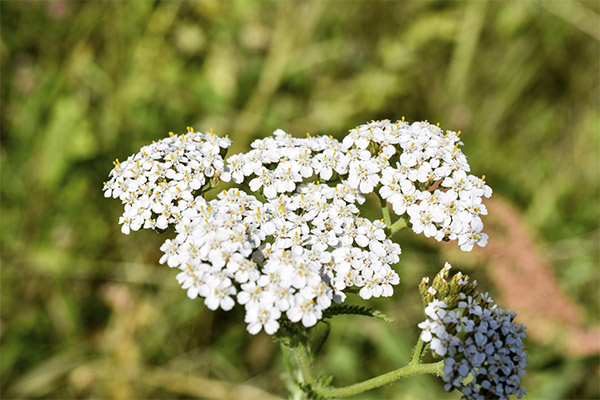
When constipated
The plant is not a laxative. The exception is a high acidity of digestive secretions at the time of admission. Feces are excreted due to the withdrawal of fluid from the walls of the gastrointestinal tract, constriction of the large intestine. It is categorically forbidden to take the herb as a laxative or stiffener for hemorrhoids, microfractures, as perforation is possible.
If the feces are compressed, it is recommended to use suppositories based on yarrow after 1-2 enemas after 2-3 days.
With sore throat
Yarrow is indispensable for purulent angina. To increase efficiency, to avoid scarring, you need to combine it with onion husks, chamomile. Take 2 tbsp. yarrow, 3 tbsp. chamomile, a cup of washed onion husk for 1 liter of steep boiling water. Inhalation to do for up to 2 minutes, immediately strain. Use as a rinse of the throat, mouth for a day. Rinse after 20-30 minutes. Improvement comes after 2-3 hours. If the temperature exceeds 38 ° C, you can use the infusion as a rinse. Any inhalations, hot compresses are prohibited.
With skin diseases
Decoction can be used as a mild antihelminthic, as softening antifungal baths. It does not help with the neglected form of fungus, disinfects and rejuvenates the skin. Not fully squeezed ingredients can be applied to areas affected by psoriasis, pustules, but keep no more than 10 minutes.
For alopecia.
A glass of fresh, finely chopped plant pour a glass of boiling water. Infuse for 15 hours. Beat 1 egg yolk until foam, squeeze 100 ml of liquid from the infusion. Stirring, add to the yolk. Remedy helps with alopecia. Keep the mask for no more than 7 minutes, rinse well with warm water. It is not desirable to apply the tool when you have thick and fast-growing hair. It revitalizes the bulb, restores the thickness of the hair, accelerates their growth.
If you add 5 drops of sea buckthorn oil to the mixture, it can eliminate spots after burns.
In case of dysentery.
Take 1 tbsp. each of St. John's wort and yarrow for 200 ml of boiling water. The remedy helps with dysentery. But you can not abuse it, because the combination is detrimental to the liver.
Diabetes mellitus
With diabetes, yarrow can be introduced into the daily diet. Be sure to include it in the first courses, sprinkle it on sandwiches, ready-made casseroles. Begin to introduce it into the diet in small amounts, adding it to hot dishes.
If there is improvement, it is important not to increase the amount, as a sharp drop in sugar up to coma is possible. In the first 2 months, you should regularly measure the glucose index. With regular use, body weight decreases markedly, the emotional background stabilizes, and the need for daytime sleep appears. Also, the appetite increases rapidly, so you should eat in small portions, not ignoring hunger. If the tea includes yarrow, be sure to add sweetness as well. In soups you need to add lean fish, meat. It is recommended to limit the use of the plant if it is prone to thrombosis. In this case, you can sprinkle a thin layer on dishes cooked in the oven, sandwiches.
Recipe: Chop a piece of veal, salt a little, sprinkle liberally with finely chopped yarrow leaves. Salt the minced chicken, mix with dill to taste. Turn the beaten meat into rolls, wrap in foil and bake until ready.
With pancreatitis
- Take ¾ tsp. each of corn-root, calendula and yarrow for 200 ml of boiling water. After boiling turn off. Infuse 3-4 hours, strain, use in 2 doses, with an interval of 6 hours.
- Bring 200 grams of honey to a boil in a water bath. Add 1 tbsp. raw materials, boil for 20 seconds. Allow to cool until warm, strain. Take 1 tsp. twice a day.
With gastritis
- Take a glass of flax seeds in 1.5 liters of cold water. Boil in a water bath until the broth begins to thicken. Add ¾ tbsp. yarrow flowers, knead, cover and allow to cool. Should come out 500 ml of thick broth. Use for a day, then take a 2 day break and repeat.
- For 0.5 liters of cold water take 2 tablespoons. oat seeds. Boil for about 10 minutes over low heat. Add 1 tsp. yarrow. Infuse for 15-20 minutes, strain, drink instead of tea. It is an excellent immune booster. After the onset of improvement, take once a day until fully recovered.
For the intestines.
If there are putrefactive processes of infectious nature, take 2 tbsp. of St. John's wort, 1 tbsp. each of nettle, chamomile, yarrow for 0.5 liters of boiling water. 3 large or 4 medium bay leaves. Turn off, stand for an hour, bring to a boil in a water bath. Then turn off again, infuse for an hour without removing from the stove. Take 30 ml. every 2 hours. Repeat after 2 weeks. Decoction kills all microflora, so it is forbidden for dysbacteriosis. It can not be used as an enema.
After treatment, you need to consume foods that contain a lot of vegetable and fatty fiber (porridge, meat). It is necessary to avoid apples, citrus fruits, raw vegetables, give preference to bananas, potatoes.
For the intestines
As a rule, inflammatory processes of the kidneys and the gastrointestinal tract are interrelated. It is advisable to take anti-inflammatory decoctions for both systems. Bring 1 liter of water to a boil. Add 2 tablespoons of bear ears, turn off, leave overnight, without stirring. Then bring to a boil in the morning, add 1 tsp. chamomile, yarrow, blueberry leaves. Turn off, let stand until warm, without stirring. Lightly strain the top 0.5 l. Consume for 12 hours in very small portions. It is a strong diuretic, which is strictly forbidden in pregnancy, renal failure, under 18 years of age with a lack of calcium in the body or problems with its absorption, autoimmune diseases.
When constipation
Yarrow is not a remedy for constipation. Tannins eliminate liquid in stools, due to which they decrease in volume and depart. For evacuation of hard stools it is advisable to use enemas. They should not be put regularly, because it reduces intestinal peristalsis, destroys beneficial microflora, destroys the mucosa.
To soften stools after colds, accompanied by high fever, take 2 tbsp. chamomile, 0.5 tsp. peel bark, 1 tbsp. yarrow for 400 ml of boiling water. Boil for 3 minutes, strain, drink in 2 drinks after 30-40 minutes. Will be severely drained gas, there may be gums. If you have severe pain, retching gas can not take the second portion, you need to sit on a water diet for 8 hours. Decoction is prohibited under 18 years of age in the presence of knots, fissures in the gastrointestinal tract, damaged mucosa. For an enema, the ingredients need to be reduced by half.
If constipation is caused by liver disease, you need to bring 350 ml of water to a boil, put it on a cold water bath, add 1 tsp. immortelle. Bring back to a boil. Add 1 tsp. nettle, yarrow, plantain. Boil for 1 minute, let cool in a water bath, strain, drink for a day to 30 ml. Repeat after 3 days. More than 3 times do not repeat the course, since it is a strong antiseptic. You can apply decoction to eczema, but a compress over 10 minutes should not be kept.
In colitis
Colitis is an irritation of the large intestine with subsequent tissue damage. Yarrow is effective if the colitis is caused by an infectious pathogen. With clostridium, escherichia and other bacilli, antibiotics should be preferred. Yarrow slows the reproduction of bacilli, but does not destroy the bacteria of this species in non-toxic doses.
In colitis, it is better to use suppositories. They are prepared as follows: 6 tbsp. of pig fat bring to a boil in a water bath. Add 1 tbsp. fresh yarrow leaves or 15 drops of oil. Turn off immediately when oil is added. Strain warm and form suppositories. Store in the freezer. Shelf life of about 2 years. They can be used as a bactericidal anti-burn ointment. Keep the candles at room temperature one hour before use. Use once a day for not more than a week.
When bleeding anus you need 100 grams of butter and pork fat to bring to a boil in a water bath. Add 2 tablespoons each of plantain and yarrow. Boil until the plants give their color to the fat, cool to a warm temperature, strain. You can use as an ointment or suppositories. By the way, it is a good prophylactic against cracking, it can be used as face and hand cream. If you add 5 tbsp. of mint, the decoction will quickly get rid of sweaty feet.
For the liver
- High effectiveness of such decoction in steatosis, at the compensatory stage of cirrhosis, to eliminate the effects of hepatitis B has been proven. Take a half teaspoon each of bearberry, corn stigmas, immortelle, yarrow, walnut leaves for 0.5 liters of cold water. Boil over low heat for 10 minutes. Drink throughout the day. The treatment lasts for 7-8 days. Decoction is also effective in inflammation of the female reproductive organs. They need to apply douches at night.
- Boil 200 grams of honey in a water bath. Add 2 tbsp. milk thistle seeds, 1 tbsp. yarrow, 2 tbsp. corn stalks. Allow to harden, do not strain. Take 3 times a day, 1 tsp. preferably 30 minutes after a meal. The composition is effective in any liver disease.
For the kidneys
When treating the kidneys, the amount and concentration should not be abused, because there is an increased load on the kidneys due to the increased withdrawal of fluids, toxins. Bleeding, hallucinations, and loss of consciousness are possible. Do not treat the kidneys with yarrow when the temperature is high, because dehydration of the body is possible.
Take 2 tbsp of rosehip on 300 ml of cold water. Boil over low heat for 8-10 minutes. Add 1 tsp. yarrow, 1 tbsp. dill seeds. Stir, turn off, infuse for 30 minutes, add honey to taste. Use 50 ml every 2 hours. Do not treat more than 2 days in a row. Repeat the course not earlier than one month, otherwise dystrophy is possible. By the way, it is a powerful anti-cellulite remedy. It is strictly forbidden in pregnancy, renal failure, during and after fever, bradycardia, lack of body weight, inability to keep a balanced diet, severe physical and mental stress, dropsy, craniocerebral injuries, cerebral edema. The remedy can be given from the age of 14 years, reducing the amount of raw material in 2 times.
If there is pus in the urine, in 750 ml of cold water to add 2 tbsp. walnut leaf, 1 tbsp. mint, 1 tsp. yarrow. Boil over low heat for 15 minutes. Cover with lid, turn off. Infuse for 6 hours, strain. Drink 50 ml every hour. After cooking you should get 700 ml. Infusion can not be used in pregnancy, internal pustules, severe helminthiasis, under 16 years of age.
To extend the remission stage of regular inflammation, take 100 grams of currants and blueberries for 1.5 liters of cold water. 1 tbsp. rose hips, 1 tsp. yarrow. Boil for 1 minute, insist about 2 hours, use with honey. Delicious decoction effectively removes mucus from the gastrointestinal tract, respiratory tract. The berries should not be discarded for needlessness, it is better to pass them through a meat grinder, add 4 tbsp of honey and mix. You can use the mixture as a mask for the face, scalp, stuffing for baking. For stuffing it is desirable to take sugar, as with honey the mixture turns out sugary. It can be frozen for later use.
For hemorrhoids
When hemorrhoids, you can combine baths and suppositories: the first - for pain relief, elimination of swelling, the second - for healing.
To relieve inflammation, 100 g of butter in a water bath should be brought to a boil. Add 10 drops of yarrow oil, allow to boil, turn off. When solidified, make suppositories. Use once a day, preferably before going to bed, after a bath.
Take a cup of plantain and 3 tablespoons of yarrow for 3 liters of cold water. Boil over low heat for 30 minutes. Allow to cool to a comfortable temperature. Strain, take a bath for no more than 10 minutes.
In a water bath mixture should preferably be prepared in glass containers. Glass should be inert, which does not react with weak acids, can withstand high temperatures with gradual heating. This is the only way to maximize the effectiveness of the remedy.
In cholecystitis.
In case of infection, take a cup each of honey and grated black radish, knead. Wait until half of the juice is released in relation to the pulp. Keep in the refrigerator, stirring 2-3 times a day. It should take about 2-3 days. Add 1.5 tablespoons of fresh yarrow leaves. Insist 7 days, stirring occasionally. Use 1 tsp. twice a day. The course of treatment to repeat not earlier than 3 months. This choleretic remedy is strictly forbidden with gallbladder abnormalities, strong bile secretion and high acidity. It is a strong choleretic. It is also effective for helminthiasis, infectious rash, pustules. In helminthiasis for children from 6 to 12 years old, yarrow should be excluded. Under 6 years of age, the remedy is strictly forbidden. From 6 to 10 years can be given 0.5 tsp. 2 times a day. In case of nausea, you should refuse to take it.
When the disease is of non-infectious nature, take 1 tsp. yarrow, immortelle on 400 ml of boiling water. Boil for no more than 30 seconds, allow to cool, take 2 times a day for no more than 4 days. Means can not drink with a strong discharge of bile, gallbladder abnormalities.
When cystitis.
- When cystitis is better used as part of dry warm compresses, salt warmed. For 0.5 kg of salt take 6 tbsp. fresh or frozen plant. Warm until hot, put in a linen bag, wrap in 2-3 layers of towel, put on the bladder. The compress should not be too hot and heavy.
- Take ¾ tsp. each of yarrow, parsley, dill seeds, abalone, cowberry leaves for 0.5 l of cold water. Bring to a boil, without stirring. Take in 30 minutes. Drink it all for 3 hours. Repeat after 3 days 5 times. It is a strong diuretic. Calcium-containing foods should be in the diet during therapy.
In prostatitis
With prostatitis, weak teas, dry compresses, baths can be used.
- Compress. For 0.5 kg of salt, take 4 tbsp. dill seeds, 1 tbsp. yarrow, 10-15 drops of the same oil, 8 tbsp. nettle. Heat until the plants begin to give off the smell, ideally in a water bath in an enamel bowl.
- Bath. Take 1 tbsp. yarrow, 2 tbsp. mint, 9 tbsp. pine for 3 liters of steep boiling water. Stir, allow to cool, strain, add 2 liters of boiled water. The bath should not take more than 3 minutes. It heals wounds, regenerates the skin, is anti-inflammatory.
From mastopathy
With mastopathy, it is strictly forbidden to use any means on their own. It is possible the rapid development of a malignant tumor, necrosis.
Take 1 tsp. yarrow, a cup of fresh plantain, 0.5 cup of aloe juice, 2 tbsp. chamomile for 200 ml. alcohol. Insist in a very cold dark place for 2 weeks. Use as a rubbing, rinsing immediately. You can use it as a wound-healing to eliminate infections in the gastrointestinal tract (1 tbsp. 4 times a day).
With varicose veins
In varicose veins, it is not advisable to use the herb. For maximum effectiveness, it should be combined with rosehip, lemon. And this is an additional toxic load on the body, increasing the acidity of the blood. You can use the herb in the neglected form in case of abscesses in the veins as compresses and orally. Massage, rubbing is strictly forbidden in varicose veins.
Take 4 tablespoons of yarrow, 5 tablespoons of plantain on 0.5 liters of water. Boil for 20 minutes over low heat in a sealed container. In a cold, strained decoction add 200 ml of alcohol. Apply the compress no more than 5 minutes. Do not resort to warm compresses, as clots can form, which can cause a rupture of blood vessels.
For coughs
Boil 0.5 liters of honey in a water bath. Add 1 tbsp. oregano, plantain, 1 tsp. yarrow, 100 ml. alcohol. Allow to harden, do not strain. Take 1 tsp. once an hour. The cough passes within 2 days. As a preventive measure, it can be added to tea. If you add a glass of ground aloe, it will help with fungus, bronchitis.
From a fever
For fever, you can take the herb only in combination with lemon or rose hips. For 0.5 liters of steep boiling water take 10 pieces of linden blossom, ¾ tbsp. yarrow. Wait until the fragrance begins to flow. In the tea put 4 circles of lemon, wait until it cools. Drink for 5-6 hours with honey. If you add 3 bay leaves and 1 tbsp. calendula to the decoction, you get a throat rinse.
From Worms
Take 1 cup of ground pumpkin seeds, 2 tbsp. black pepper (can be ground), 0.5 tsp. tsp. tansy, 1 tsp. yarrow for 0.5 liters of alcohol. Infuse for 3 weeks. Use no more than 1 tsp. 2 times a day.
For enemas, pour a glass of onion husks 400 ml boiling water, cover and leave for the night. Add 3 tbsp. yarrow, boil on a water bath for 30 minutes. For an enema to take 2/3 of the broth and 1/3 of boiled water. Put an enema once a day for 3-4 days in a row. This is a very strong anthelmintic. It is also effective for purulent hemorrhoids, but it must be diluted 1 to 1 with boiled water.
With heartburn.
For heartburn, the plant is ineffective. Weak teas with honey can be used.
Glass of flax seeds pour 0.5 liters of cold water, leave overnight, bring to a boil. Add ¾ tsp. yarrow (preferably fresh or frozen), without sweetening with buckwheat honey (it can cause heartburn). Decant the top 200 ml. Pour the rest. Drink for 3 hours in small portions.
Allergies
The herb should not be used when allergic to chemicals, insect bites, as an unpredictable chemical reaction is possible. But it is good for relieving swellings, prevents rashes, removes burning.
For a compress bring 200 ml of water to a boil in a water bath. Add 3 tbsp. finely chopped white cabbage (preferably early varieties). Boil for 15 minutes, add 1 tbsp. yarrow, cool. Apply a cold compress, which is good for pulling boils, calluses.
In Oncology.
Treatment of cancer with yarrow is toxic, is not an alternative to the drugs of traditional medicine, because the harm exceeds the benefit.
Bring 1 liter of honey to a boil in a water bath. Boil 0.5 liters of carrot puree with honey for 30 minutes, stirring constantly. Add 1 tbsp. yarrow, 0.5 tsp. celandine. Boil for 10 minutes, add 200 ml of brandy and 100 ml of alcohol, turn off. Wait until the mixture cools. Take no more than 1 tsp. 3 times a day. When heart disease, exclude celandine, add 3 tbsp. yarrow.
In menopause
Pi menopause should not quickly increase the hormonal background. There may be pressure surges, nervousness or apathy. If there are sleep disorders, take ¾ tsp. each of hawthorn and yarrow for 200 ml of cold water. Bring to a boil, strain through a sieve. Very tasty tea comes out with the addition of quince, pear, mandarin peels. It stimulates digestion, with lemon - increases the overall tone of the body.
The herb is perfectly digested with seafood. Slice 200g of crab sticks randomly, grate 150g of hard cheese or 2 melted cheese, add 1 tsp of fresh yarrow. Dress with mayonnaise. Season with salt and vinegar 10 minutes before serving. Yarrow with salt gives a bitter taste.
For thrush.
For douches, take 1 tbsp. yarrow, 2 tbsp. nettle, ¼ tsp. celandine, ½ tsp. St. John's wort for 200 ml of steep boiling water. Leave for the night, strain, irrigate once a day for a week every other day. It is desirable to use in the form of a bath as a strong bactericidal agent.
Meteorism
Meteorism is a consequence of detrimental microflora in the gastrointestinal tract or liver disease. For 0.5 liters of boiling water take 2 tbsp. mint, 1 tbsp. immortelle flowers, 1 tsp. yarrow, turn off. Drink for 2 hours, repeat 2 times.
With asthma
In asthma you can drink only mild teas. In overdose, asphyxiation is possible. 0.5 cup pine needles pour 0.5 liters of cold water, leave for 3 hours. Bring to a boil. Add 1 tsp. yarrow, 0.5 tsp. mint, cool until warm, strain. Consume throughout the day in very small portions. You need to drink a lot of water, pine can cause an asthmatic attack.
Types of medicinal compositions
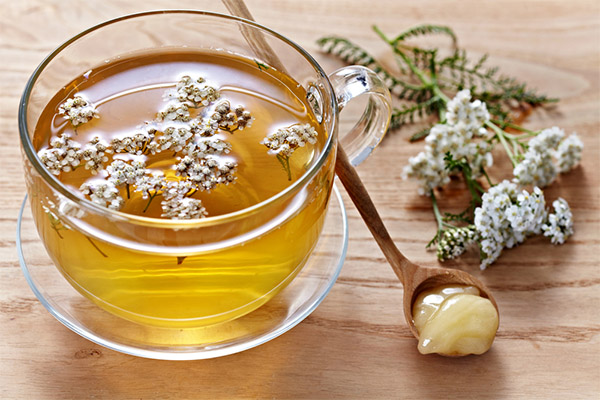
Infusion .
Take 1 tbsp. each of yarrow, raspberry leaf and pour 200 ml of boiling water. Leave in a thermos for 3 hours. Take a 100 ml. infusion for about 2 hours. The last 100 ml of strain, drink in 2 drinks. Infusion reduces fever, eliminates gas. It can not be drunk with high acidity, strong biliary excretion. For children from 6 years of age, the ingredients should be halved. It is desirable to increase the amount of water by half. Up to 6 years old yarrow substitute 3 tbsp. dried raspberries for 400 ml. Give the infusion sweetened.
Tincture
For 700 ml of alcohol take 4 tbsp. grinded black hot pepper, 1 tsp. yarrow. Insist in a dark cool place for 2 weeks. Tincture helps with helminths, gastrointestinal infections. Do not use it more than 1 tbsp. 3 times a day, combining with a caloric diet.
Decoction .
Take 0.5 liters of young oat seeds for 1.5 liters of boiling water. Boil for 5 minutes over low heat. Add a half cup of flax seeds and boil for 10 minutes. Add ¾ tbsp. yarrow, let cool. Strain the top 0.5 liters, drink for 6 hours without eating. Squeeze the mixture. You can put it through a meat grinder and then use as a mask. Pour the broth into small portions and freeze. If you add 3 tablespoons of mixture to 200 ml of boiled in a water bath of pig fat, you get a cream for anti-aging massage, eliminating the "goose and orange skin.
Tea
Tea is a faithful remedy, which will allow the body to be young, constantly healthy for a long time. If you accustom the body to the plant gradually, it will thank him a quick regeneration of cells, excellent health.
Take 4 tbsp. blackberry leaf, 4 dried pears, 1 tsp. yarrow for 1 liter of cold water. Bring to a boil, allow to cool to a comfortable temperature, sweeten. Tea increases appetite, immunity, cleanses the gastrointestinal tract.
Ointment .
Take 1 tsp. of yarrow, plantain, chamomile, celandine, St. John's wort, 2 Tbsp. ground aloe on 100 ml. boiling in a water bath. Wait until it boils. Indications for the ointment - infectious rashes, pusts.
Yarrow oil: properties and application
The essential oil of yarrow has a dark bluish color. Unlike the shoots, flowers and leaves, it has a low concentration of tannins, so there may be a decrease in astringent properties. Due to its high content of sesquiterpenes, it has the following effects:
- relieves inflammation, swelling;
- improves blood circulation;
- anesthetizes;
- Strengthens local immunity of the skin, hair follicles;
- eliminates spasms;
- Warms the skin in the area of application;
- Stabilizes hormonal background during menopause;
- Soothes irritation on burns;
- Cleanses the skin with psoriasis, eczema.
The oil is used in cosmetology, medicine, as a repellent, fragrance.
Cosmetic applications.
For hair
Beat 2 yolks till foam. Add 25 drops of yarrow oil and 2 tablespoons of aloe juice. Stir well and apply to washed hair. Leave on for 30 minutes, then wash your hair. Repeat no more than once a month. Remedy helps with alopecia, avitaminosis, infections. It can not be used for dry brittle hair, you need to add 1 tbsp. sunflower oil, 5 drops of olive oil and yarrow. Apply once every 2 weeks. The mixture is good for curly, frizzy hair. If the hair gains volume, you can use once a month, as an abnormal increase in the hair follicle is possible.
For the skin
Whip an egg yolk into a foam with 1 tbsp. butter. Add 3 drops of yarrow oil and ¼ tsp of honey. Stir well. The mask should be left on a clean skin for not more than 2 minutes. It disinfects the skin and smoothes out wrinkles. For rejuvenation you can add 1 tbsp. cucumber and pumpkin juice each.
Contraindications for use
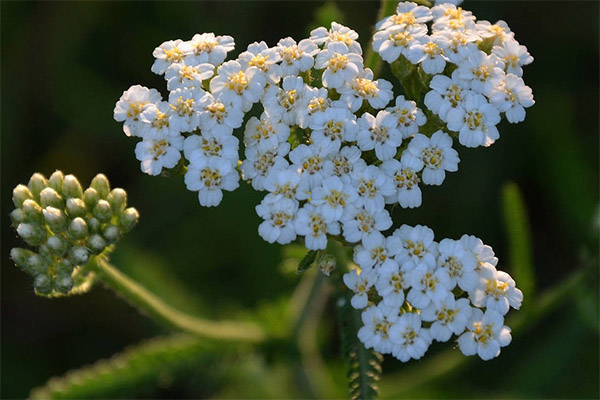
Yarrow is contraindicated in the presence of the following diseases and conditions:
- pregnancy;
- Low blood pressure, slow heartbeat, arrhythmia;
- Increased blood clotting, thrombosis;
- Increased acidity of the blood, gastrointestinal;
- lack of calcium, magnesium in the body;
- Taking medications or folk remedies that remove fluid from the body;
- Temperature above 38°C or 37.5°C for more than a day;
- Under 6 years of age.
If the hormonal balance in women is disturbed by more than 15%, you can not take the herb without the consent of a therapist and gynecologist.
Can yarrow be given to rabbits?
Rabbits eagerly consume yarrow because of its bitter taste and specific aroma. This feed:
- stimulates digestion;
- strengthens the hematopoietic system;
- increases acidity;
- kills intestinal parasites;
- relieves inflammation;
- stimulates the growth of young animals;
- reduces the likelihood of infection with coccidiosis.
But you can not give them yarrow growing near roads, enterprises of heavy and light industry, in areas with polluted atmosphere. Gather it in the first phase of flowering, then rinse thoroughly with cold water and dry at no more than 50°C without exposure to sunlight.
«Important: All information on this site is provided for informational purposes only for informational purposes only. Before applying any recommendations, consult a health care professional. specialist. Neither the editors nor the authors shall be liable for any possible harm caused by materials."

